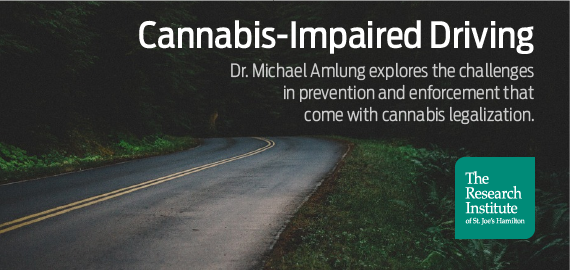A Study of Facts to Counter the Fiction about Cannabis

St. Joe’s Experts Say More Research Needed on Driving High
With cannabis legalization on the horizon, concerns over the particulars of cannabis sales and distribution seem to be the focus of recent news coverage. However, one critical aspect of legalized cannabis that is not getting the full attention it deserves is cannabis impaired driving, roadside testing, and enforcement – according to researchers at St. Joseph’s Healthcare Hamilton.
Studies have shown that cannabis consumption negatively affects key cognitive and motor functions needed to drive safely – including motor coordination, decision-making, attention, and reaction time. In fact, according to government statistics, 149 drivers who were fatally injured while driving in 2014 tested positive for cannabis. In 2016, there were over 3000 cannabis-related driving impairment incidents reported in Canada.
Despite these troubling statistics, approximately one fifth of youths believe that driving under the influence of cannabis is either less dangerous than alcohol impairment or entirely safe – a conception that has public safety officials worried.
“Research to date shows cannabis impaired driving is a major public safety concern that has the potential to expand following legalization,” wrote Dr. Michael Amlung, in a recently published editorial in the Canadian Journal of Addiction. Amlung’s article stresses the need for prioritizing research on cannabis and impaired driving.
Dr. Amlung is an assistant professor in the Department of Psychiatry and Behavioural Neurosciences at McMaster University. As well, he is a researcher at the Peter Boris Centre for Addictions research at St. Joseph’s Healthcare Hamilton and the Michael G. DeGroote Centre for Medicinal Cannabis Research. Amlung studies addictive disorders, including addiction related to alcohol and cannabis.
Preemptive messaging, including Canada’s Lower-Risk Cannabis Use Guidelines (LRCUG), may be critical in the prevention of cannabis impaired driving. Published by the Canadian Research Initiative in Substance Misuse, the LRCUG specifically warn against cannabis impaired driving. It lists several factors to consider for those who choose to use cannabis. In addition, the guidelines detail the various health risks associated with cannabis use, including reproductive, respiratory, and mental health problems.
“Broader dissemination of these guidelines and continued research on this important public health issue will contribute to further development of effective prevention strategies and enforcement policies,” wrote Amlung.
Enforcement is another issue. Amlung notes that there is debate on the ideal method to assess cannabis-related impairment during roadside stops. He points to the Standard Field Sobriety Test, used by the RCMP and other law enforcement agencies, which has been shown to be inconsistent in determining impairment.
Other roadside cannabis testing options include saliva tests. Though recently approved by the Attorney General for RCMP roadside use, experts have noted that more research is needed to enhance the reliability of saliva testing. Issues have been raised due to chemical markers from cannabis that can remain in the body several days after consumption and still register a positive result, despite any impairment effects having worn off.
“Significant levels of THC are maintained in [fatty] tissue in the body for extended periods following use,” noted Amlung. He explained that saliva tests may register positive for cannabis “long after the psychoactive effects have dissipated.”
Further concern for researchers and law enforcement is the fact that cannabis potency has doubled in the last twenty years. In particular, Amlung points to high-potency concentrates, such as cannabis “shatter” – a potent form of butane hash oil – that contain many times more THC than ordinary cannabis. Research on the effects of these concentrates is “virtually nonexistent,” according to researchers at St. Joseph’s Healthcare Hamilton.
“Each of these issues presents a pressing need for continued research,” Amlung remarked. “Since St. Joe’s is fortunate to have both addictions and medicinal cannabis research centres, we’re in an ideal position to continue our leadership in this growing field.”
As a major form of cannabis-related risk, St. Joe’s is substantially expanding its research on cannabis-impaired driving.
“We have a number of observational studies monitoring cannabis use and impaired driving is among our top priorities,” said Dr. James MacKillop, the Peter Boris Chair in Addictions Research and Director of both the Peter Boris Centre for Addictions Research and the Michael G. DeGroote Centre for Medicinal Cannabis Research. “Diminished attention and motor coordination that can lead to significant driving impairment are very well established risks of cannabis use and apply to all users, not just heavy users or individuals with cannabis use disorder,” commented Mackillop, “that’s why it’s one of the areas we are most focused on over the course of legalization.”
St. Joe’s is uniquely positioned to conduct cannabis research as it has partnered with McMaster University to create the Michael G. DeGroote Centre for Medicinal Cannabis Research, the only research centre in Canada that is exclusively dedicated to studying cannabis. The Centre is dedicated to establishing an evidence-based understanding of cannabis, both in terms of medical applications and risks.
According to MacKillop, “especially as we approach legalization, a key goal for the Centre is to make sure people have the facts about cannabis, not the many fictions that are all over the Internet.”
MacKillop has previously given expert guidance to the Senate Subcommittee on Veterans Affairs, where questions related to cannabis legalization and its impact on veterans experiencing PTSD were addressed.
“Everyone needs to be aware of the potential dangers associated with cannabis use,” explained Amlung. “If we are going to be responsible about legalization, we need to ensure that we are effectively communicating the risks and breaking down the myths associated with cannabis use.”
Read more about what St. Joe’s experts are saying about cannabis.




